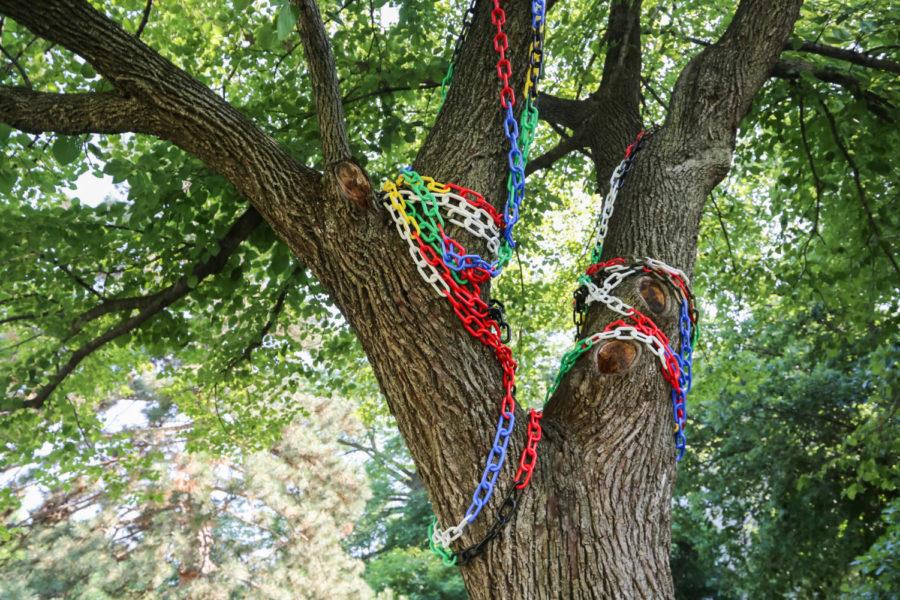- App Content
- App Content / News
- News
- News / Diversity
- News / Politics And Administration
- News / Politics And Administration / Campus
Iowa State ‘Tree of Oppression’ garners mixed reactions
Mikinna Kerns/Iowa State Daily
The Tree of Oppression located outside of Parks Library.
July 6, 2018
A recent initiative from the Iowa State student government to create a “Tree of Oppression,” which represents the macro and microaggressions against marginalized students on campus, has garnered mixed reactions from the community.
Iowa State student body president Julian Neely says the tree will increase awareness of students being marginalized.
“The Tree of Oppression project started last year as an idea from diversity and inclusion,” Neely said. “We wanted to talk about the groups and identities that are still being marginalized today. We usually host town halls with people who are already aware of these issues but this tree will bring the conversation to everyone.”
While the tree was allotted $1,000, Neely said they spent $935 — $660 on the heavy-duty, multi-colored plastic chains, $240 on a larger sign used for events and $35 on a smaller yard sign.
The sign posted in front of the tree explains the chains’ significance.
“This tree represents the countless identities that face oppression on campus each day. Each color represents a different identity waiting to break the chains of bondage,” according to the sign.
Neely said the sign contains contact information for students to give their feedback in addition to the opportunity to meet with members of Student Government diversity and inclusion to talk about campus improvements.
While many are seeing the tree as a welcome addition to campus, the initiative has had some negative feedback too.
“The Student Government, Iowa State University allocated $1,000 of student/taxpayer money to the Diversity and Inclusion Committee to go towards a “Tree of Oppression,” said the The Iowa Federation of College Republicans in a Facebook post. “This tree is supposed to help students ‘understand and internalize the oppressive acts experienced by various marginalized groups on campus.’ How much longer will taxpayers allow our public universities to teach an entire generation that we’re victims?”
Iowa State College Republicans added their thoughts on the tree in their own Facebook post, “the only oppressed groups on campus are those who are conservative; everything else is #FakeNews!”
These comments come after a recent study completed on campus to gauge the campus climate. In the survey, 19 percent of respondents reported experiencing exclusionary, intimidating, offensive or hostile conduct on campus.
Thirty percent of those respondents who experienced this conduct believed it was because of their gender identity. Twenty-one percent felt it was based on their race or ethnicity.
Twenty-nine percent of survey respondents observed conduct directed toward a person or group of people on campus which they believe created an exclusionary, intimidating, offensive and/or hostile working or learning environment at Iowa State within the last year.
The report showed some of these sentiments were felt towards conservatives on campus with one respondent saying, “Politically conservative students are often afraid to speak about their views, because liberal students often call us ‘racist, sexist, etc.’ for simply disagreeing with their ideas.”
When reached out to for comment, the Iowa State College Republicans said they “stand by the statements made by the Iowa Federation of College Republicans.”
Neely said he has heard people telling him to stop playing the victim but has also seen people “very happy it is on campus.”
“At the end of the day it is there to create a conversation, and people are happy about that,” Neely said. “People realize it isn’t okay to keep shoving these things under the rug. We have had people disagree with it, and we expected to see that. I have a feeling we will hear a lot more feedback when students come back to campus.”
When it comes to the comment from College Republicans, Neely said student government is a non-partisan group and is focused on serving and representing students rather than a political entity.
“People from all backgrounds, political beliefs and socioeconomic status voted on this, we do not discriminate regarding anyone’s political belief,” Neely said.
Despite these different backgrounds, Neely said the legislation was able to pass the Student Government Senate on a 20-1-1 vote.
Editor’s note: This article was updated to include the cost breakdown of the tree and two signs.







